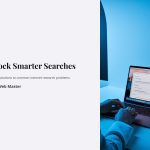 As digital content multiplies at breakneck speed, effective online research has become both more vital and more complex. From students crafting academic papers to marketers tracking industry trends, everyone relies on internet searches. However, this convenience often brings challenges—information overload, inaccurate sources, bias, and technical search inefficiencies. With the evolution of search engine algorithms, such as Google’s Helpful Content Update, and the rising prevalence of AI-generated content, users must now be savvier than ever to extract relevant, high-quality information. This guide dives deep into the real-world issues researchers face and provides actionable solutions for each.
As digital content multiplies at breakneck speed, effective online research has become both more vital and more complex. From students crafting academic papers to marketers tracking industry trends, everyone relies on internet searches. However, this convenience often brings challenges—information overload, inaccurate sources, bias, and technical search inefficiencies. With the evolution of search engine algorithms, such as Google’s Helpful Content Update, and the rising prevalence of AI-generated content, users must now be savvier than ever to extract relevant, high-quality information. This guide dives deep into the real-world issues researchers face and provides actionable solutions for each.

Struggling with Information Overload? Here’s How to Focus Your Search
A common pitfall in digital research is being bombarded by too much information. Typing a basic query into a search engine often returns thousands or even millions of results. This abundance can be overwhelming and confusing, especially when the top results don’t directly address your needs.
To fix this, use search operators and advanced filters. Keywords in quotes (e.g., “artificial intelligence in marketing”), exclusion terms (e.g., -Reddit), and site-specific searches (e.g., site:nytimes.com) significantly narrow down results. Google Scholar, Semantic Scholar, or other domain-specific engines can help filter academic or expert-level content only. Additionally, always scan the first page critically—ads and SEO-optimized but unhelpful articles often rank higher than informative ones.

Falling for Misinformation? How to Spot Reliable Sources
Another major issue in internet research is verifying credibility. With countless blogs, AI-written content, and unmoderated platforms, users often cite or trust information from unreliable sources without realizing it.
Start by checking the domain authority—.gov, .edu, and .org domains are generally more trustworthy. Look at the author credentials, publication date, and whether the content is backed by data or references. Tools like Media Bias/Fact Check or extensions like NewsGuard can help evaluate the trustworthiness of news and blog websites. Also, compare at least 3 independent sources to ensure consistency and reduce bias.

Not Getting What You Need? Mastering Boolean and Keyword Strategies
People often type full questions or vague phrases into search bars, which results in less accurate hits. Poor keyword choice and not leveraging search logic often leads to irrelevant results.
Solution? Learn and apply Boolean logic: AND narrows results, OR expands them, and NOT (or minus symbol) excludes terms. Use wildcard symbols (*) for unknowns, and apply parentheses for more complex logic structures. For example, “(digital marketing OR SEO) AND trends 2025 -Reddit” gives a refined and meaningful result list. Training yourself to think like a search engine can dramatically improve research efficiency.

Stuck Behind Paywalls or Limited Access? Here’s How to Navigate It
Many of the best resources—academic journals, industry reports, or niche tools—are behind paywalls or require subscriptions. This can halt your research progress or limit your findings.
Workarounds include using open-access databases like PubMed Central, CORE, or arXiv. You can also look up the paper title in Google Scholar and check for a PDF in the right-hand column. If unavailable, try tools like Unpaywall or reach out to the author directly—many are willing to share a copy. Institutional access through libraries or student accounts can also unlock a treasure trove of information.

Trouble Organizing Your Research? Tools That Make a Difference
Effective research isn’t just about finding data—it’s also about organizing it for future use. If you find yourself opening too many tabs, copying links into messy documents, or forgetting where you saw a quote, then it’s time to level up your digital organization.
Use reference managers like Zotero, Mendeley, or EndNote to keep track of citations, notes, and PDFs. Tools like Notion or Obsidian can help structure and visualize your ideas with tagging systems and backlinking. Bookmark managers like Raindrop.io are excellent for grouping research by category. The key is to make your digital library searchable and accessible across devices.

Biased Results? Understand Search Engine Algorithms and Personalization
Search engines personalize results based on your history, location, and behavior. While this seems helpful, it can trap you in an echo chamber, feeding you the same types of content over and over.
To counter this, try using incognito mode or switching search engines (DuckDuckGo, Startpage) that don’t track user behavior. Log out of your Google account or clear browser cookies before starting your search. Comparing results across engines can reveal how personalization skews your results. Understanding this helps you see a broader perspective and reach more balanced conclusi
*Capturing unauthorized images is prohibited*



